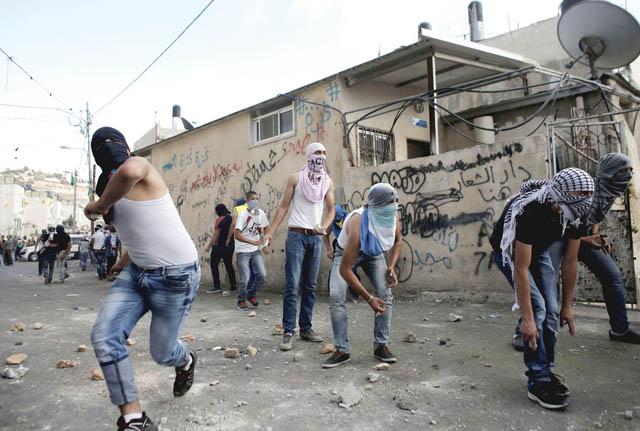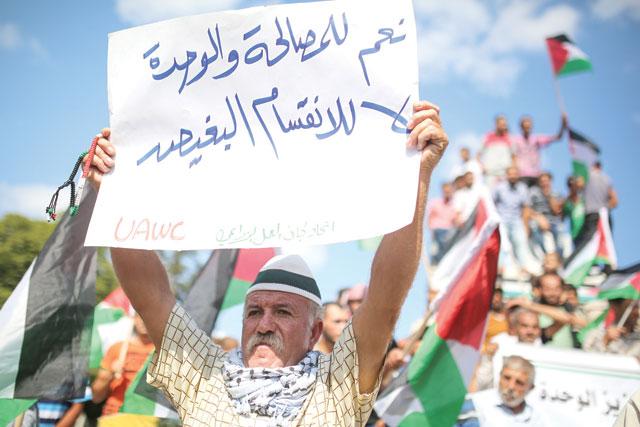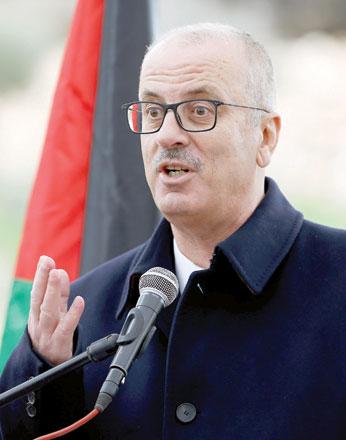You are here
Abbas may end unity with Hamas over Gaza governance
By AFP - Sep 07,2014 - Last updated at Sep 07,2014

RAMALLAH — Palestinian President Mahmoud Abbas has threatened to break off a unity agreement with Hamas if the Islamist movement does not allow the government to operate properly in the Gaza Strip.
And Prime Minister Rami Hamdallah told AFP a dispute with Hamas over the payment of salaries to thousands of its employees had become the main issue from preventing his government of national unity from operating inside Gaza.
Abbas' accusation that Hamas was effectively running a parallel administration in Gaza drew an angry reaction from the Islamist movement, which denounced his allegations as “baseless”.
But it raised fresh questions over the future of a fragile intra-Palestinian unity deal aimed at ending seven years of rival administrations in the West Bank and Gaza.
"We will not accept the situation with Hamas continuing as it is at the moment," Abbas said in remarks published by official Palestinian news agency WAFA.
"We won't accept a partnership with them if the situation continues like this in Gaza, where there is a shadow government... running the territory," he said.
"The national consensus government cannot do anything on the ground," he charged.
Later on Sunday, Abbas appeared on the verge of another public attack on Hamas in the opening of his address to the Arab League in Cairo.
Just 30 seconds into his speech, which referenced Hamas' forcible takeover of Gaza in 2007, Abbas was handed a note and abruptly stopped speaking as an official quickly ordered journalists out of the room.
The very public dispute erupted some two weeks after the end of a major 50-day confrontation between Israel and Hamas fighters in Gaza, which killed more than 2,100 Palestinians and 72 in Israel.
In Gaza, spokesman Sami Abu Zuhri said Abbas' allegations that Hamas was hampering the operations of the national consensus government were "unjustified".
"It is untrue, baseless and unfair to our people," he said.
Shadow government in Gaza?
Throughout the conflict, Hamas and Fateh put up a united front, working side-by-side to further indirect truce talks with Israel in Cairo, which resulted in an open-ended ceasefire that took effect on August 26.
But as the guns fell silent, their long-held divisions again came to the fore.
Under the terms of April agreement, Hamas agreed to work with its rivals in Abbas’ Fateh movement to form an interim consensus government of technocrats which would work towards long-delayed national elections.
The deal sought to end years of bitter and sometimes bloody rivalry between Hamas and Fateh, which dominates the West Bank-based Palestinian Authority.
The new Cabinet took office on June 2, with Gaza’s Hamas government officially stepping down the same day.
Despite the handover, Hamas has remained the de facto power in Gaza, with moves to implement the provisions of the unity deal put on hold in the face of the deadly offensive that Israel launched on July 8.
“This unity government should control both the West Bank and the Gaza Strip but there are many things blocking its work,” the prime minister told AFP in an interview.
First and foremost among the problems was the matter of salaries, which had left him caught between a rock and a hard place, he said.
On the one hand, the international community had threatened a suspension of aid if the wages were paid to employees of a group blacklisted as a “terror organisation” while on the other, Hamdallah himself had received “threats” if he were to visit Gaza without first resolving the salary crisis.
Since signing the agreement in April, Hamas has demanded the new government take responsibility for paying its 45,000 employees, 27,000 of whom are civil servants.
“Putting Hamas employees on the government payroll is the main problem which is preventing the government from working in the Gaza Strip,” said Hamdallah.
“The government and the banks operating in the Palestinian territories were warned that if they make these payments to former Hamas government employees in Gaza then the government and the people will be boycotted,” he said.
“If this happens, the Palestinian banking system will face a huge problem that will threaten the Palestinian situation in general.”
The Palestinians are heavily dependent on international aid with a boycott likely to have a devastating financial impact on its financial viability.
Hamdallah said an unidentified “third party” was working to solve the crisis by delivering the payments, with “positive indications” it would be resolved soon.
Qatar has agreed to cover the costs of the former Hamas employees, although the money has yet to be transferred.
Related Articles
OCCUPIED JERUSALEM — Palestinian Prime Minister Rami Hamdallah will travel to Gaza on October 2 as part of a fresh push to end a decade-long
RAMALLAH — Palestinian leaders have asked Prime Minister Rami Hamdallah for a "temporary" Cabinet reshuffle, officials said Wednesday, as in
RAMALLAH, Palestinian Territories — Palestinian Prime Minister Rami Hamdallah offered to resign on Monday, as President Mahmoud Abbas seeks













